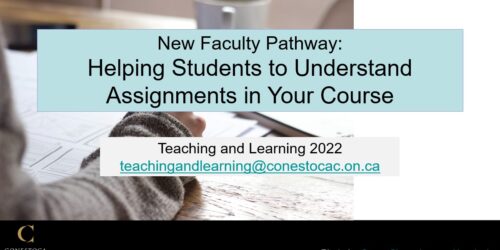The Success of International Students at Conestoga College
By Dr. Sara Kafashan and Dr. Nasreen Sultana
Note: This post contains initial thoughts from Sara and Nasreen, Teaching & Learning Consultants who originally came to Canada as international students. Both Sara and Nasreen have had personal experiences as international students and post-secondary educators in Canada.
Similar factors contribute to the retention of international and domestic students in post-secondary education within North America (e.g., Haverila et al., 2020). For example, for both international and domestic students, finances and grades impact retention rates. Certain factors, however, are more important for groups of students. For example, for international students, a sense of belonging, study skills, and adjustment to the post-secondary education system play a significantly more impactful role on retention. Instructional quality had a significantly stronger impact on the retention of domestic students, as compared to international students.
Instructional quality, however, is still of high importance for all, including international students. Ammigan and Jones (2018) found that quality and expertise of faculty, their teaching ability, academic content, and organization of the course are the most influential factors for international student success. For example, sharing class notes and lesson slides are helpful for international students to appropriately follow class discussions (Melguizo-Garde & Yetano, 2021). Furthermore, the success of international students is not linear, noting that initial adjustment phases (e.g., cultural, educational, and linguistic) play complex roles in predicting success (Haverila et al., 2020; Melguizo-Garde & Yetano, 2021).
In fact, predictors of international students thriving in post-secondary institutions include (1) the presence of diversity and a sense of belonging; (2) support; and (3) confidence (Jones & Kim, 2020). Conestoga has vast diversity in our student body, which, when nurtured, can facilitate a strong sense of belonging, collegiality, and support for international students. Moreover, international student confidence, as well as sense of belonging and support, can also be boosted by positive student-faculty relations and interactions (Jones & Kim, 2020). When faculty, for example, can provide kind, encouraging, culturally sensitive learning spaces where additional barriers to learning are not reinforced (i.e., faculty are willing to provide adequate time for student processing and focus on the use of plain language to communicate), international students can, and indeed do, thrive in post-secondary institutions within North America (Jones & Kim, 2020).
Faculty-student interactions and relationship, as well as the faculty’s role in the classroom also plays an essential part in the academic adaptation of international students (Aigerim & Luu, 2022). For example, in many Asian countries, students may have a closer relationship with professors and students are less independent in their learning. So, when students start exploring active learning and independent learning environments, which are common in North American colleges, it may create initial cultural and cognitive dissonance. As noted, however, students of color, including those who are international, have been shown to be able to thrive in post-secondary contexts, but need different (not necessarily additional) support from domestic white students (e.g., Ash & Schreiner, 2016). Such is evidenced by a powerful quote from Zhou and Zhang (2014), in their study about first year international students within an Ontario College:
“Even though a large portion of international students have limited English language proficiency upon entry, limited knowledge about Canadian culture, different learning habits and education values and beliefs, most international students commit to the goal of obtaining a [post-secondary diploma from a Canadian institution]. Such commitment will not easily drop since they are willing to leave their families to study in a foreign place and acknowledge the financial and emotional costs that their studying aboard causes their parents.”
(Zhou & Zhang, 2014, p. 15)
At Conestoga, we see that international students from some national backgrounds, may have higher or lower marks in math and communications courses than domestic students. Taking into account the above research and the personal experiences of Nasreen and Sara, Teaching & Learning believes this can be expected as students figure out a new educational context and build their skills. In outcomes-based education (OBE), a pass means the student has met the outcomes. We know that most international students in 2021 passed their math and communications courses. In Communications courses, international students from India for example, have a median mark of 64% which is almost 10% above a pass (See Conestoga IELTS and Student Performance Study, 2021 by Institutional Research). Thus, faculty can focus on supporting students and in most cases those students will be successful. As with domestic students, there will be some individuals who excel and some who do not pass due to their personal strengths, challenges, prior experiences, or beginning skills set.
Please reach out to teachingandlearning@conestogac.on.ca if you are looking for strategies to support international students in your course(s).
References
Ammigan, R., & Jones, E. (2018). Improving the student experience: Learning from a comparative study of international student satisfaction. Journal of Studies in International Education, 22(4), 283–301. https://doi.org/10.1177/1028315318773137
Conestoga College (Feb, 2019). Comparison of the ability and success of international and domestic students in select courses. Report produced by Mark Kane, Office of Institutional Research and Planning.
Conestoga College (May 14, 2021). IELTS and Student Performance. Produced by Office of Institutional Research and Planning.
Haverila, M. J., Haverila, K., & McLaughlin, C. (2020). Variables affecting the retention intentions of students in higher education insituitions: A comparison between international and domestic students. Journal of International Students, 10, p. 358-382. Doi: 10.32674/jis.v10i2.1849
Jones, A. H. & Kim, Y. K. (2020). The role of academic self-confidence on thriving among international college students in the U.S. and Canada. Journal of Underrepresented and Minority Progress, 4, p. 165-191. http://ojed.org/jump
Melguizo-Garde, M., & Yetano, A. (2021). Are Chinese Students Studying at European Universities Satisfied? Performance and Challenges. In Global Perspectives on Recruiting International Students : Challenges and Opportunities (First edition, pp. 173- 186). Emerald Publishing Limited.
Yerken, & Nguyen Luu, L. A. (2022). A stepping stone to the “West”: Academic adaptation of international students from post-Soviet countries in Hungary. International Journal of Intercultural Relations, 89, 183–194. https://doi.org/10.1016/j.ijintrel.2022.06.005
Zhou, G., and Zhang, Z. (2014). A Study of the First Year International Students at a Canadian University: Challenges and Experiences with Social Integration. Canadian and International Education / Education canadienne et international, 43(2), 1-18.



